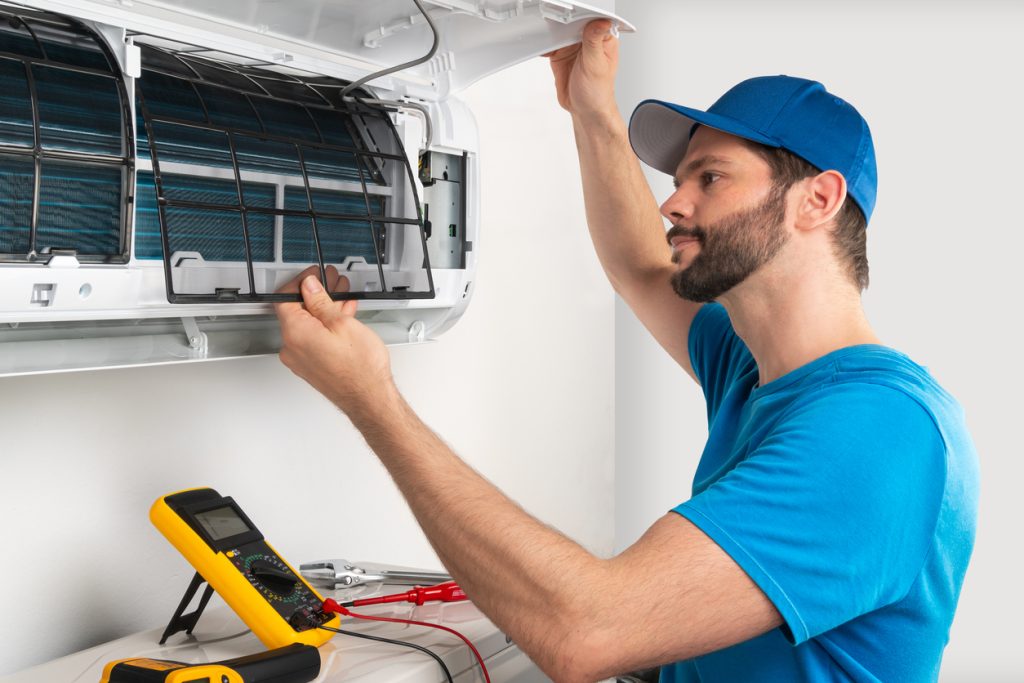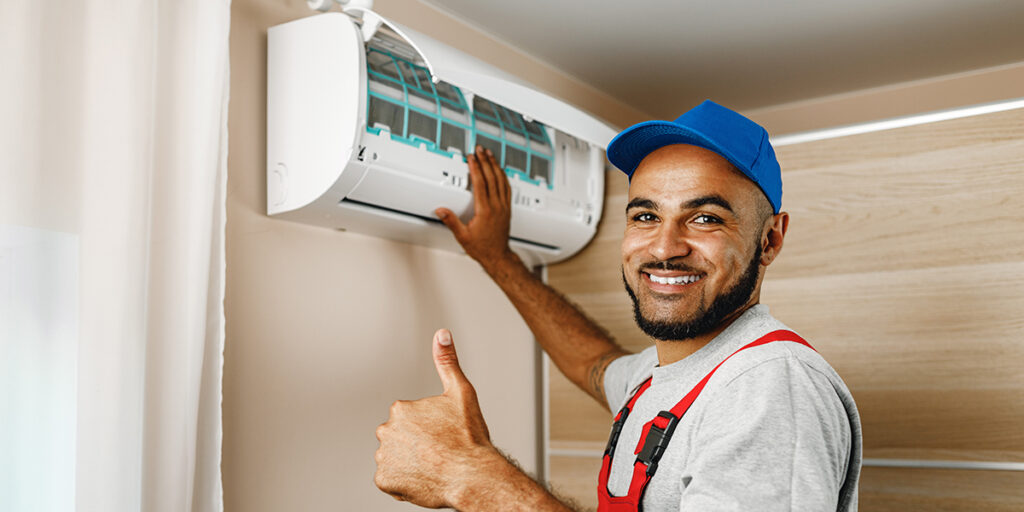The Ultimate Guide To Repair Air Conditioner Near Me
Air Conditioner Repair Near Me: Professional Cooling System Remediation Guarantees Your Home Stays Comfortable Throughout The Year
Kinds Of A/c Systems
When dealing with AC repair, comprehending the type of air conditioning system you're handling can conserve time, cash, and aggravation. Ever questioned why some systems cool a space faster than others? Or why certain systems appear to break down more frequently? Let's peel back the layers.
Central Air
Getting My Air Conditioner Repair Near Me To Work
Imagine a cool breeze streaming through an entire house, whispering comfort into every corner. Central air systems do exactly that. They utilize a network of ducts to distribute cooled air, depending on a compressor and condenser outside, paired with an evaporator coil inside. When this complex monster fails, determining the issue can be like discovering a needle in a haystack.
Split Systems

Split systems are a popular option for lots of homes-- part indoor system, part outdoor compressor. They provide flexibility and performance, but their dual nature implies repair work can involve either component. Have you ever heard an unusual noise outside your house just to discover the indoor unit isn't cooling? That's a traditional indication of a split system glitch.
The 30-Second Trick For Air Conditioning Repair
Window Units
These compact warriors battle summer season heat by fitting snugly into a window frame. They combine all elements into a single box. Their simplicity often means fewer repair work headaches, but overlooking filters or permitting particles buildup can cause lessened efficiency or breakdowns.
Ductless Mini-Splits
More About Ac Fixing
Ductless systems bypass ductwork totally, making them ideal for homes without existing ventilation. They're peaceful, efficient, and remarkably resistant. Yet, when repairs are needed, service technicians need to be click here adept at dealing with refrigerant lines and electrical connections-- no small feat.
Quick Reference Table
| Type | Secret Features | Common Repair Work Issues |
|---|---|---|
| Central Air | Ductwork, whole-house cooling | Duct leakages, compressor failure |
| Split System | Indoor & & outdoor systems | Refrigerant leaks, fan motor issues |
| Window System | All-in-one, easy setup | Filthy filters, electrical faults |
| Ductless Mini-Split | No ducts, zoned cooling | Line leaks, sensor breakdowns |
The 45-Second Trick For Ac Repair Near Me
Deciphering one of the most Frequent AC Issues
Have you ever questioned why your a/c all of a sudden stops cooling during a sweltering afternoon? One typical perpetrator is a filthy or clogged up air filter. This tricky bad guy limits air flow, forcing your system to work overtime, which not just lowers performance but can also lead to early breakdowns. Envision trying to breathe through a scarf taken in dust-- it's exhausting!
Another regular misstep is refrigerant leakages. These invisible leaks do not simply decrease cooling power however can also damage the compressor, the heart of your AC unit. How frequently do you look for unusual hissing sounds or ice formation on the coils? Catching these indications early can conserve you from pricey repairs down the line.
Beyond the Basics: Lesser-Known Issues
Air Conditioning Repair Can Be Fun For Anyone
Often, the thermostat itself is the nuisance. Miscalibrated or malfunctioning thermostats send blended signals, causing the air conditioning to cycle unpredictably. Ever experienced your AC turning on and off in quick succession? That's called short cycling, a sneaky performance drainer that can break parts much faster than you 'd anticipate.
Electrical issues, such as used electrical wiring or a malfunctioning capacitor, might prowl below the surface area. AC Fixing. These often manifest as AC systems stopping working to start or all of a sudden closing down. A professional eye knows to test these components with precision tools, something a casual look will not expose
Expert Tips for Diagnosing Common Air Conditioning Issues
Getting The Ac Repair To Work
- Examine and replace air filters routinely-- every 1 to 3 months depending on use and environment.
- Listen for unusual sounds like rattling or buzzing that might signal loose parts or electrical faults.
- Inspect the outside system for particles or obstructions that impede airflow and trigger overheating.
- Look for frost accumulation on evaporator coils, a tip towards refrigerant issues or air flow constraints.
- Test the thermostat settings and recalibrate if the temperature readings feel off.
Quick Reference Table: Symptoms & & Probable Causes

| Symptom | Probable Cause | Specialist Tip |
|---|---|---|
| Warm air blowing | Low refrigerant or filthy coils | Tidy coils and inspect for leakages right away |
| Brief cycling | Thermostat concerns or large system | Change thermostat settings and seek advice from sizing standards |
| Unit won't begin | Electrical faults or capacitor failure | Test wiring and replace capacitors as required |
| Water leak | Clogged drain line or frozen evaporator | Clear drain lines and check for coil icing |
DO IT YOURSELF Air Conditioner Maintenance Tips
The Ultimate Guide To Air Conditioner Repair Near Me
Ever noticed your air conditioning unit sputtering like an old engine on a hot summer day? Disregarding subtle signs typically suggests more than just a sweaty afternoon-- it's a prelude to unexpected AC repair costs. What if you could catch those whispers before they turn into wails? Routine do it yourself upkeep can be your very first line of defense.
Simple Steps to Keep Your Air Conditioner Running Smoothly
Everything about Ac Fixing
- Tidy or Replace Filters: A clogged up filter is like trying to breathe through a headscarf. Every 1-3 months, examine and switch out your filters. It enhances air flow and performance, preventing compressor pressure.
- Examine the Condenser Coils: Dust and debris function as unnoticeable blankets smothering your system's cooling power. Gently brush or vacuum the coils, but avoid severe chemicals that may deteriorate the metal.
- Examine the Drain Line: When was the last time you glimpsed at your drain pan? A blocked drain can cause water leaks and foster mold development. Flushing it with a vinegar solution monthly keeps the flow clear.
- Seal and Insulate: Are your ductworks whispering leaks? Sealing gaps with mastic or foil tape enhances effectiveness and cuts down on unequal cooling.
Pro Tips Beyond the Fundamentals
- Procedure your unit's voltage to capture subtle electrical wear before it sparks big issues.
- Listen for uncommon hums or rattles-- these acoustic breadcrumbs frequently signify loose parts or stopping working motors.
- Keep outside units shaded but guarantee a minimum of two feet of clearance around them for optimal air flow.
Ask yourself: Are you hearing your a/c's quiet SOS or simply awaiting it to shout? Taking some time for DIY air conditioner maintenance changes reactive repair work into proactive care, conserving sweat, stress, and yes, cash.
The Main Principles Of Repair Air Conditioner Near Me
Why Proficiency in AC Repair Work Matters
Imagine this: your air conditioner system sputters and groans during a scorching afternoon, leaving you sweltering inside your home. Would you trust a beginner fumbling with fragile elements, or would you look for the peace of mind of a expert a/c service technician!.?.!? The intricacies of modern-day air conditioning systems require accuracy and experience. A slight miscalculation can intensify a minor breakdown into a pricey disaster.
Some Known Facts About Ac Fixing.
Unseen Intricacies Behind the Cool Breeze
Numerous underestimate the layers concealed beneath the streamlined exterior of an AC system - Fix Air Conditioner. From refrigerant leaks that quietly drain effectiveness to faulty thermostats that misread temperatures, these issues need more than a basic toolkit. Experts possess an eager eye for diagnosing issues that average house owners neglect
Necessary Tips for Selecting the Right Technician
Ac Repair Can Be Fun For Everyone
- Certification and Training: Confirm credentials; a specialist trained in the current HVAC innovations is invaluable.
- Experience with Specific Systems: Not all a/c units are produced equivalent; discover someone knowledgeable about your design's peculiarities.
- Diagnostic Approach: Knowledgeable specialists utilize sophisticated tools-- like electronic leak detectors and thermal imaging-- to pinpoint surprise faults.
What to Get out of a Pro's Diagnostic Process
| Action | Function | Expert Insight |
|---|---|---|
| Visual Assessment | Recognize obvious wear or damage | Try to find corrosion or unusual noises-- an indicator often neglected |
| Pressure Testing | Detect refrigerant leakages | Subtle pressure drops can mean micro leakages invisible to the naked eye |
| Electrical Checking | Ensure circuit integrity | Loose connections can simulate extreme mechanical failures |
The Best Guide To Ac Air Conditioner Repair
Why Do It Yourself Frequently Falls Short
Tempting as it is to tinker with your a/c system, do it yourself repairs regularly miss the origin. For circumstances, topping off refrigerant might temporarily cool your space but neglects leaks that get worse over time. Professional technicians don't simply spot symptoms; they hound the underlying mechanical and electrical faults that sap efficiency.
Everything about Ac Repair
Concerns to Ask Before Hiring
- What diagnostic tools do you use to identify concerns?
- Can you describe the repair process and expected results?
- Are you knowledgeable about the refrigerants compatible with my unit?
- Do you follow safety protocols for dealing with electrical elements?